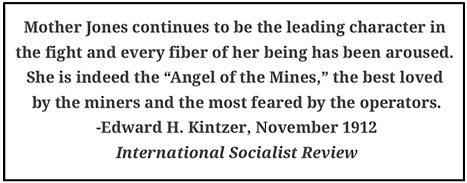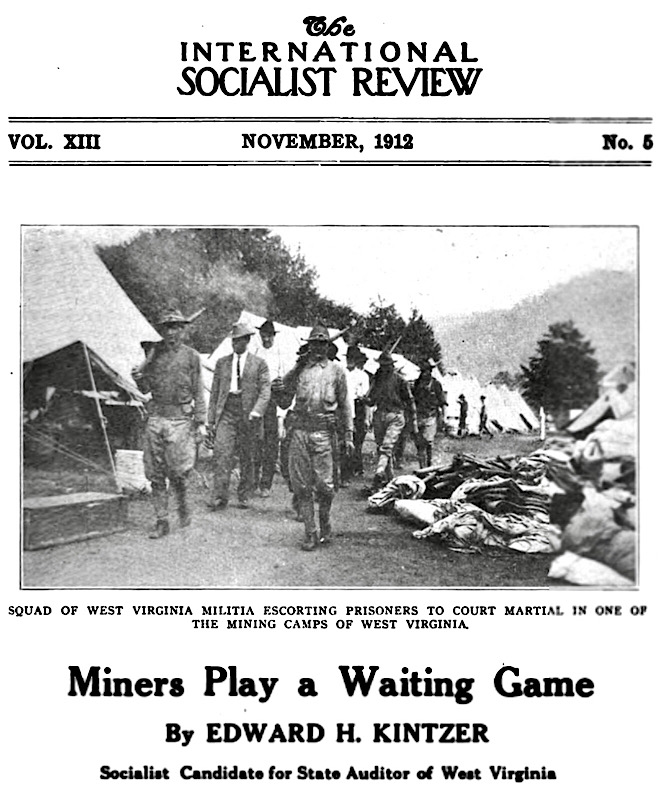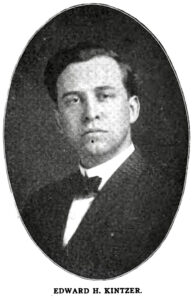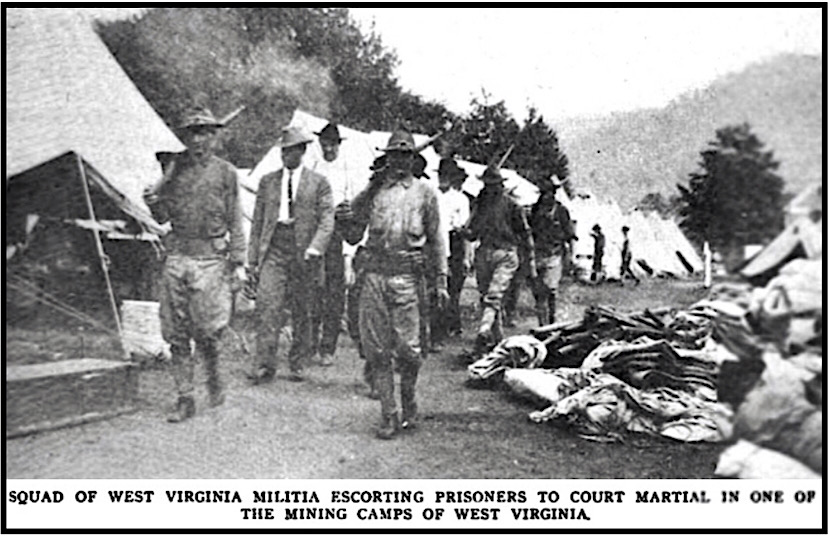 —————
—————
Hellraisers Journal – Thursday November 7, 1912
West Virginia Miners Play a Waiting Game
-by Edward H. Kintzer, Socialist Candidate for State Auditor
From the International Socialist Review of November 1912:
WITH the calmness of seasoned soldiers, with a purpose that presages no good to the operators, with defiance that brooks no interference with that purpose, the battling miners of West Virginia await the coming war-of-the-ballots.
In dealing with the armed mine guards these mountaineers were taught valuable lessons in solidarity and cohesion which made them effective in meeting this force. So, after delivering a blow of direct action against the operators, with equal intelligence they are preparing to strike at the ballot box. They have organized themselves in spirit if not in fact, having learned to do by concerted action whatever is to be done.
They are not living in a fool’s paradise expecting the capitalist orders to collapse because a majority might wish it to. Back of their political action there is something more tangible than a mere expression of choice.
And well there should be, for heretofore no election has gone against the operators. They will stop at nothing to purchase votes and stuff ballot boxes. They have bought legislators like they purchase mine props, “made” governors with impunity, and with open effrontery placed two senators in congress against the wishes of the people.
Frank Bohn, associate editor of the REVIEW, while recently touring West Virginia on a speaking campaign, said: “The situation here regarding Senator Watson ought to receive wide publicity. There is nothing else like it. Other Watsons exist but none of them are in congress.”
It is the coal industry and organized “Big Business” that the miners must oppose-these interests that named Watson and Chilton United States senators.
SOCIALISM IS EASY.
It is not difficult to teach these battling miners the fundamentals of Socialism, for the class struggle to them is very apparent and the hallucination of “dividing up” and “destroying the homes” has no terrors for them. They have nothing to divide and no home to destroy. Having recently been evicted they know that nothing could accomplish these things more effectively than capitalism. Their only assets are experience, hope and determination. This experience suggests action, their hope is Socialism and their determination means victory.
Frank J. Hayes, vice-president of the national organization of the United Mine Workers, in a recent letter states the political situation quite clearly. He said:
We have an excellent chance of electing the entire Socialist ticket in Kanawha county. The miners poll 40 per cent of the total vote in this county and they are practically all Socialists, made so by the present strike.
This is the county [Kanawha] in which Charleston, the capital of the state, is located, and, moreover, if we capture the political power of this big county it will practically insure the success of our strike. It is a great opportunity.
Politicians of the old school are admitting that the Socialist ticket will win. Even last March, before the strike, Adjutant General Elliott, absolute dictator by right of martial law over Paint and Cabin Creek districts, stated to the writer: “Unless Roosevelt is nominated by the Republicans there is some question whether the Socialists will be first or second.” He stated that he had been over the lower section (meaning Kanawha county) and knew. He resides at Charleston.
Thomas L. Tincher, a locomotive engineer, is the Socialist candidate for sheriff. He is making the guard system the issue in the campaign.
[Says Tincher:]
A Socialist sheriff would solve the mine guard problem quickly. All he would have to do would be to enforce the law and the mine guard would become a useless institution.
With exceptional outbreaks of hostility between the mine guards and the miners, the situation in the martial law district is quiet. The operators, mine guards and miners are disposed to play a waiting game.
DAMAGING TESTIMONY.
The one point that is of most interest is the strike commission taking testimony, where the mass of evidence adduced presents a strong indictment of the coal companies and their hired band of murderers.
In searching the region the militia confiscated many machine guns that had been purchased by the operators and used by the mine guards. This evidence before the commission has not strengthened the position of the operators.
Greed and the fierce struggle to earn dividends on a water soaked capitalization produced a chain of circumstances that are the most damning of record.
There are many communities that are almost deserted, for no one who will not work for the coal company is allowed occupancy of the houses. The strike has brought production to a standstill.
Mucklow, where the two-day battle occurred, is a deserted village except for the presence of a few mine officials and guards. It all sounds like a tale of the Arcadians except the proximity to civilization (?).
One of the families evicted in this village was composed of four generations of Cranes. Louise, a baby, who was suffering from summer complaint, her father, grandfather and great grandfather. When evicted-dispossessed-these people were forced to tramp over the hills many miles. They could not stay in Mucklow even though the union offered to pay the rent. They were told that unless they worked for the company they would have to leave. Even the fields and roads at Mucklow offered them no camping place, for they all are owned by the company.
These three men had toiled in the mines, but what of that? They had been good workers-but what of that? They were old and the baby sick-but no matter; they would not meekly submit to the conditions, so out they had to go.
This happened early in September. Baby Louise is now well. A ragged tent with the stars and stripes floating over it is the abode of these people, who produced enough wealth to live in comfort, of which the system robbed them of nearly all.
“To some it may seem a joke-the American flag here,” said Crane when asked about the flag, “but I don’t know of a better banner for Americans who are willing to starve for the sake of liberty, to fight under.”
Conditions in the tented villages look about the same, only a little bit more ragged. All about there is more cheer, for the intolerable heat has gone and excepting several cold and rainy nights, the weather has been comfortable. The foliage is turning and the leaves are falling. In another month, unless a great change comes, there will be intense misery in the camps. The fruit and berries will have disappeared and the gaunt figures of hunger and cold will be trooping among them.
When martial law began many mining camps that had become a menace to health were visited and a clean-up ordered.
“God walks upon the seas and land but the devil is here in these hills,” said Adjutant-General Elliott, while inspecting these camps. “Fifteen miles away from here is civilization where are many automobiles and women who fondle poodle dogs, and there are churches and preachers. And here-well, you see. When the trouble broke out I went through this district at the behest of the governor, and I reported to him that God does not walk in these hills. I saw neither a rosebud or geranium.”
GROWING SYMPATHY.
If this strike were conducted against coal operators that had competitors in the field, as in former years, the operators would now be on their knees to the men. The mines are shut down; but the coal is produced elsewhere.
The miners all over are a wakening to this and there is a growing bond of sympathy and solidarity. There is a likelihood of this strike spreading to all the mines in this state.
Mother Jones continues to be the leading character in the fight and every fiber of her being has been aroused. She is indeed the “Angel of the Mines,” the best loved by the miners and the most feared by the operators.
———-
[Emphasis added.]
~~~~~~~~~~~~~~~~~~~~~~~~~
SOURCE & IMAGES
International Socialist Review
(Chicago, Illinois)
-Nov 1912, p391 (9 of 68), quote p393
https://www.marxists.org/history/usa/pubs/isr/v13n05-nov-1912-ISR-gog-ocr.pdf
See also:
Hellraisers Journal – Sunday April 28, 1912
Socialist Party Organizing in West Virginia by Harold Houston
Tag: E. H. Kintzer
https://weneverforget.org/tag/e-h-kintzer/
Tag: Paint Creek-Cabin Creek Strike of 1912-1913
https://weneverforget.org/tag/paint-creek-cabin-creek-strike-of-1912-1913/
~~~~~~~~~~~~~~~~~~~~~~~~~
West Virginia My Home – Hazel Dickens



